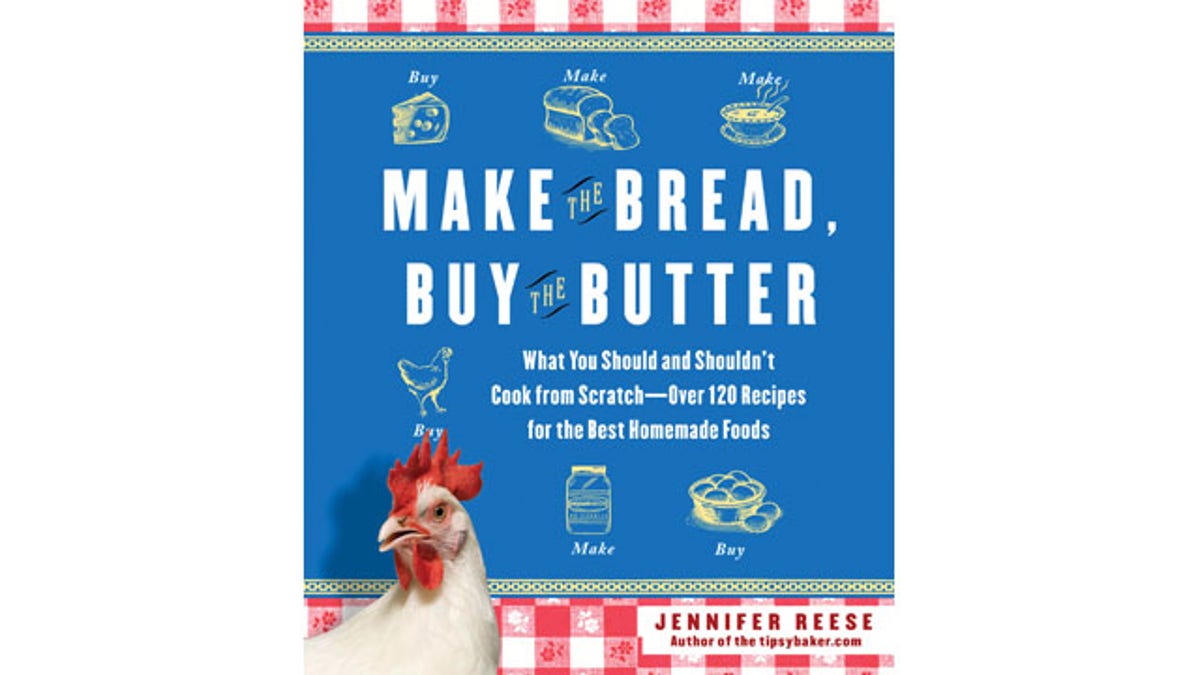
(Free Press)
Kitchen DIY—or making food from scratch—is turning the simple act of cooking into a status symbol. We're not talking just buying the ingredients here. We're talking about growing the food or raising the animals to make it.
That’s never what cooking was meant to be. But well-intentioned folks seem to be on a holy mission to encourage everyone to explore where and how their food is raised and cook everything we eat.
That works for food writers and cooking professionals with expense accounts, but hardly for working people with families. Sometimes that weekly pilgrimage to farmer’s market is just impossible.
Making food from scratch is terrific if you’re blessed with time, but it won’t make you a better or more interesting person. Just a better cook.
Jennifer Reese wanted to be a better cook. She had the desire, and thanks to losing her job, the time. Refreshingly, she didn’t want to go all high-end French and gourmet. Laura Ingalls Wilder was her inspiration.
Losing your job forces you to find new and ever more imaginative ways to save. Reese’s cooking desire grew out of her obsession to economize. She wanted to know when cooking-from-scratch generated significant savings and when it made better-tasting food.
She stakes out a self-deprecating middle ground between the makes-you-feel-bad preachiness and the desire to provide good food for people you love in, "Make The Bread, Buy The Butter" (Free Press).
“I wasn’t going to replace lost income by raising chickens and baking bread,” says Reese. But she thought she’d save money. She’s about what you “could,” not what you “should” do.
Check out some of Reese's recipes:
How to make homemade fig bars.
Reese’s “could” turned her kitchen into a cheese- and bread-making factory and her backyard into a cross between a third-world village and a fake suburban farm with wandering chickens, ducks, goats and turkeys.
Make or buy your roast.
Killing her first chicken, Arlene (actually it was a rooster whose loudness proved fatal) didn’t create an “epiphany” or a “sense of interconnectedness,” with the world, says Reese. Hallelujah. Instead, with every bite she fixated on Arlene’s free-range diet consisting primarily of centipedes—the downside of knowing how your food is raised. Roasting a chicken, she says, is only slightly cheaper than buying a rotisserie one.
Buy your chevre.
Reese didn’t dispatch Peppermint, her Nigerian Dwarf goat, with garden shears like Arlene. That’s because Peppermint and later, Patty, a Nubian, were dairy, not meat, sources.
Once you go Nigerian Dwarf, apparently, you never go back. Reese (and her neighbors) discovered that Nubians are profoundly and annoyingly vocal. Today’s Nigerian Dwarves are the lucky survivors of a breed that Reese says was originally used to feed lions and tigers en route to America in the 1930s. As of the book’s publication, an investment of $1600 for goats, vet bills, feed, a hutch, stud fees, etc. has yielded zero milk. Buy your chevre.
Make your vanilla.
Scrape vanilla beans into vodka and store for three months, agitating occasionally. Reese’s twelve-ounce recipe costs about $7.00 and lasts indefinitely. The equivalent amount of McCormick’s is $53.00. Double that for high-end Nielsen-Massey. Make.
Made your buds.
Homemade mashed potatoes are always best but Reese surprised herself when she tried Betty Crocker Potato Buds. Aside from finding the Buds stickier than homemade, “I could have sat down and eaten the whole pot,” she says. Make, but Buds aren’t bad.
Buy your jams
Jams and lemonade make sense only if you have a free fruit source, as their cost makes homemade prohibitive. Buy.
Make the Worcestershire Sauce (lasts forever in the fridge) but the buy cream cheese, “my family never liked the tartness of homemade,” she says.
Buy your breadcrumbs and bacon, make pancetta
Breadcrumbs from stale bread cost nothing while store-bought ranges from $2.50 to $6.00 per pound. That’s more than ground beef, Reese points out, “and completely insane.” Make.
Buy bacon but make pancetta. Pancetta’s cured like bacon but isn’t smoked. It’s $4.00/lb. for homemade, $29.00/lb. for store-bought. Make.
Buy your bread
Depending on where you live, you can find bakers who live for their crusty, artisanal loaves. Baking bread is for enthusiasts with nothing but time. Buy, says Reese. But you’ve got to with homemade bagel for sheer taste. You won’t save much, she says, but your family will love you. Bagels: Make.
Buy your condiments
Homemade mayo quickly goes bad but it’s for company, not “my son’s salami sandwich.” Buy. Same for ketchup, “people expect that Heinz taste.” Buy. “Homemade potato chips are never as good as from the bag,” she says. Buy.
Make your sweets, unless it's rice pudding
Make chocolate chip cookies, Rice Krispie treats and pudding. But buy rice pudding. Hard as she tried, says Reese, “I never made a rice pudding as good as Cozy Shack.” Buy.




















